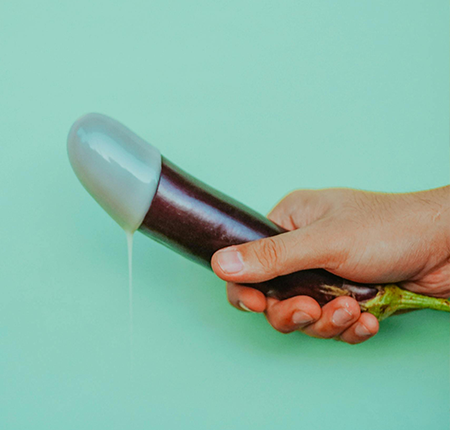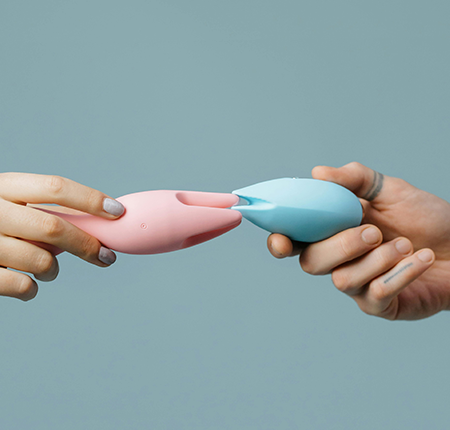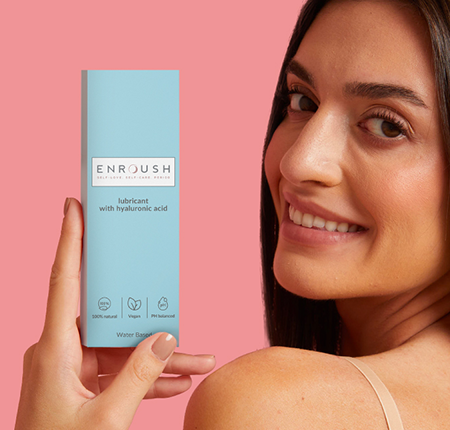
Yes, sometimes sex can be painful. It's not just you, millions of women (up to 75%, statistics say) experience discomfort during sex at some point. When stress, vaginal dryness, or a lack of natural lubrication come into play and the act becomes uncomfortable, lubricant can provide that much-needed relief for more pleasure and fluidity.
But here's a side of the story that's not often talked about: not all lubes are created equal. Not all of them take care of your body the way you expect. Recent research shows that many lubes on the market may contain toxic chemicals like parabens, undeclared flavors, and fragrances, which can dehydrate and irritate vaginal tissue in the long run. Do you read the label before you buy a lube? Find out everything you need to know to make the right choice.
What is intimate lubricant?
Intimate lubricant is a substance in liquid or gel form, whose main purpose is to reduce dryness and painful friction during sexual intercourse.
Without friction, the risk of irritation, pain, vaginal micro-injuries decreases, as well as the risk of the condom breaking, and pleasure intensifies.
Natural lubrication vs. artificial lubricants
The human body has its own natural lubrication system, which usually starts with arousal and maintains comfort during intimate moments. Its role is to moisturize and protect vaginal tissue, prevent friction and irritation, and increase pleasure while maintaining the natural balance of the intimate area.
But as natural as this lubrication is, it is also natural for it to not be as abundant, or to be completely absent, at certain times in life. For example, during a stressful period. Or postpartum, during menopause and other biological changes.
Just as natural lubrication doesn't always mean you're aroused, a lack of it doesn't automatically indicate a lack of sexual desire. Your body works at its own pace, and desire can be there even when natural lubrication isn't. In these situations, you just need a little help.
Artificial lubricants basically try to mimic natural lubrication so that intimate moments feel as natural and pleasurable as they should. Depending on how they are formulated, they can provide the support you need to enjoy intimacy without worry and discomfort, at any stage of life.

Types of lubricants
Depending on how they are formulated, there are lubricants for all types of sex, including during masturbation or with sex toys.
Here are the types of lubricants available based on their basic ingredients, and how to choose the right one for you based on how you plan to use it.
Water-based lubricant
Water-based lubricants, as the name suggests, are formulated with water as the main ingredient.
They act and feel most similar to natural vaginal lubrication, which is still water-based. They generally quickly reduce discomfort and dryness, can be moisturizing, and are condom-compatible (but always check the packaging to be sure).
Silicone-based lubricant
Silicone-based lubricants contain silicone as their main ingredient, which is not absorbed into the body and, unlike water, cannot moisturize vaginal tissue.
They form a kind of film that traps and retains moisture, but can also trap bacteria or dirt particles. Usually, careful cleansing after use is needed to keep the skin clean and healthy.
However, their advantage is that they provide long-lasting lubrication, longer than water-based ones. You can use them with latex condoms.
Oil-based lubricant
Based on essential oils such as coconut, almond, or shea, oil-based lubricants provide the longest-lasting lubrication.
Generally, they are not compatible with condoms due to their composition, but they can be the perfect choice for shower sex due to their water resistance.
Special lubricants: with heating, cooling or flavored effects
Special lubricants are usually water- or silicone-based, but also contain small amounts of mild irritants such as menthol, capsicum, or eucalyptus. These stimulate nerve endings in the skin or mucous membranes, causing sensations of varying intensity that the body interprets as cold, heat, massage, even vibrations and electrifying sensations.
There are also lubricants with different flavors (fruit, chocolate, menthol), generally used for oral sex.
It is important to read the label carefully when choosing a special-effect lubricant to avoid strong irritants and fully enjoy the experience.
What is lubricating gel used for?
You can use the lubricating gel both during sexual intercourse with a partner and in intimate solo moments. Its purpose is to reduce friction and prevent irritation when natural lubrication is not enough, to transform your sexual experiences into moments of pleasure without discomfort.
Combating vaginal dryness
Vaginal dryness is one of the most common situations when women choose to use an intimate lubricant.
Dryness can be occasional, based on stress, hormonal changes, or certain medical treatments, or it can be chronic, due to menopause or a gynecological problem like vaginal atrophy. If you experience vaginal dryness frequently, talk to your doctor to find the cause and find a solution.
In these situations, lubricant helps to temporarily moisturize the intimate area, reducing the discomfort and irritation that can occur in the absence of lubrication.
Increased comfort during sexual intercourse
Lubricant reduces friction and facilitates gliding, which means it automatically increases the degree of comfort during sex and allows for the enjoyable exploration of new sexual techniques and positions .
Following a CHSP study of 2,453 women, over 70% of participants said they enjoyed more pleasurable and comfortable intimate moments when they used lubricant.
Intensification of sexual pleasure
Both special lubricants with a warming or cooling effect and natural ones can enhance pleasurable sensations. Because they reduce discomfort, they facilitate smoother penetration and a stronger connection between partners.
Compatibility with condoms
If you use condoms, it is very important to choose a compatible type of lubricant. Always read the label, both the one on the lubricant and the one on the condom, to make sure that the two can be used together.
Oil-based lubricants, for example, cannot be used with condoms because they can break them down. Generally, water-based or silicone-based lubricants are compatible with latex condoms.
Compatibility with sex toys
As with condoms, it's important to use compatible lubricants to ensure they won't damage sex toys. Water-based lubricants are generally safe to use with most materials.
Silicone-based lubricants, on the other hand, are not recommended with silicone toys because they can damage them.

How to choose the right lubricant for you
If until now you were choosing a lubricant strictly based on flavor, price, and packaging design, find out that there are much more important criteria you should take into account, including those related to your health. Here's what to look for to choose the right lubricant:
Choose according to the type of sexual activity
Each type of lubricant may be ideal for certain activities, but completely unsuitable for others. Always consider what you're going to do, where, and whether you'll be using condoms or toys.
Don't choose an oil-based lubricant if you're going to have protected sex. Don't choose a water-based lubricant if you're going to have sex in the shower. Make sure you consider compatibility criteria and that the lubricant you choose won't compromise your experience.
Read the label: ingredients and allergens
Recent studies show that often, manufacturers do not dedicate enough time to creating lubricants that are truly safe and healthy for vaginal tissue.
Many of the lubricants on the market can contain parabens, perfumes, hidden flavors, and other toxic substances that, in the long term, can irritate the vaginal lining and lead to dryness and discomfort. That's why it's important to always read the label to avoid loaded and irritating formulas.
Choose lubricants with simple, natural ingredients that are gentle on the skin, formulated as closely as possible to natural lubrication. This way you ensure that you are not only protecting your pleasure during intimate moments, but also your long-term health.
How to use lubricant correctly
As important as it is to pay attention to the ingredients and choose a lubricant that is right for you, it is equally essential to use it correctly. Even the seemingly ideal product can have less than pleasant effects if not used properly.
Follow these recommendations to ensure you have a pleasant experience:
- Perform a skin test first , applying a small amount to your hand or arm to check if it is a formula that is friendly to your skin.
- Apply lubricant before sexual intercourse for easy and comfortable glide.
- Avoid lubricants with irritating ingredients , including those with a warming or cooling effect, especially if you have sensitive skin.
- Store the lubricant correctly , according to the instructions on the packaging, to avoid altering the formula.
Why choose lubricants with natural ingredients?
In general, lubricants with natural ingredients are gentler on sensitive skin and reduce the risk of allergic reactions due to their clean composition, free of irritating chemicals. They also protect the balance of vaginal flora, because they do not contain toxic substances such as synthetic fragrances and parabens.
In short, it is recommended to choose natural products to support your body with the delicate protection and comfort you need.
But it's important to keep in mind that "natural" doesn't automatically mean "risk-free." Even natural ingredients can sometimes cause allergic reactions, especially if you have sensitive skin. That's why it's best to choose a lubricant that's dermatologically tested and free of irritating ingredients.
Enroush lubricant with hyaluronic acid
Did you know that natural lubrication is mainly made up of water and various types of acid, such as lactic acid that maintains the intimate pH balance? Well, Enroush lubricant perfectly mimics natural vaginal lubrication, with a 100% natural water-based formula enriched with lactic acid and deeply hydrating hyaluronic acid.
Thanks to the glycerin in its composition, our lubricant helps reduce friction and prevents micro-lesions, ensuring silky glide without a feeling of dryness. In addition, it does not contain parabens, sulfates or perfume and is dermatologically tested, so you can forget about irritations and enjoy every intimate moment without discomfort and without compromise.

Frequently asked questions about lubricant
Intimate lubricants can raise a lot of questions, and that's normal, especially if you're using them for the first time or if you've never gone into the details. It's important to know all the answers and understand exactly how to make the right choice for you and your comfort during intimate moments, so below we've answered the most common questions about their use:
Does intimate lubricant affect condom effectiveness?
You can safely use lubricant with condoms, as long as you check compatibility. Water-based and silicone-based lubricants are generally safe with latex condoms and will not damage them. However, avoid oil-based lubricants as they can break down latex, increasing the risk of condom breakage.
Is it safe to use intimate lubricant during pregnancy?
Most water-based or silicone-based lubricants are safe during pregnancy, but it's best to choose natural products that are free of fragrances or irritants. If you have any questions, always ask your doctor before making a decision.
Can intimate lubricant cause infections or irritation?
If you choose your lubricant carefully and opt for one with 100% natural ingredients, like Enroush's, without aggressive ingredients or toxic chemicals, it shouldn't cause you any allergic reactions.
However, some ingredients may cause irritation if you have sensitive skin or suffer from certain allergies. So always test the product first on a small area of skin and discontinue use if signs of inflammation appear.
Does intimate lubricant help with pain during sexual intercourse?
Yes, if the pain is caused by vaginal dryness or lack of lubrication, lubricant can reduce the friction and irritation that causes discomfort. According to statistics, over 70% of women enjoy more pleasurable intimate moments when they use it.
However, if the pain persists, it may indicate a more serious condition. Painful sex is not normal, and it's important to talk to a doctor as soon as possible to find out what's really going on.
Can intimate lubricant be used during masturbation?
Of course! The role of lubricant is to reduce discomfort and enhance your pleasure during intimate moments, both with your partner and in solo moments.
What do you do if the lubricant causes stinging or discomfort?
Discontinue use of the lubricant immediately if allergic reactions occur, rinse the area thoroughly with lukewarm water, and avoid using other irritating products. If symptoms persist, consult a doctor.
Photo source: Pexels.com






















